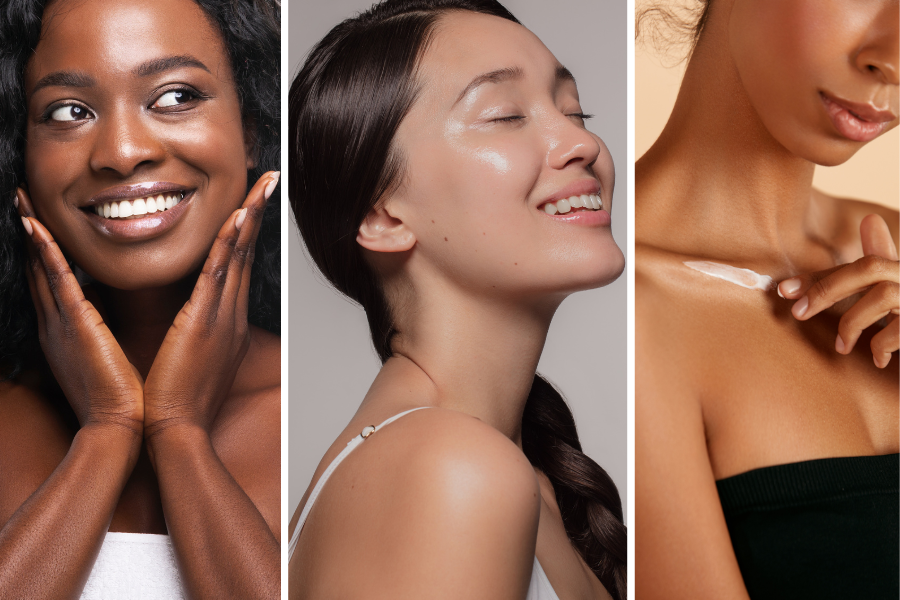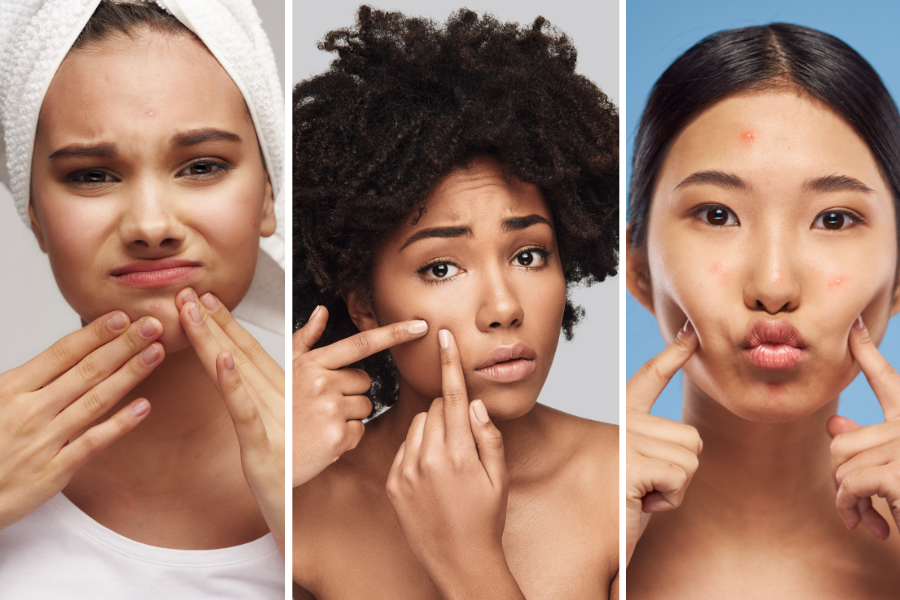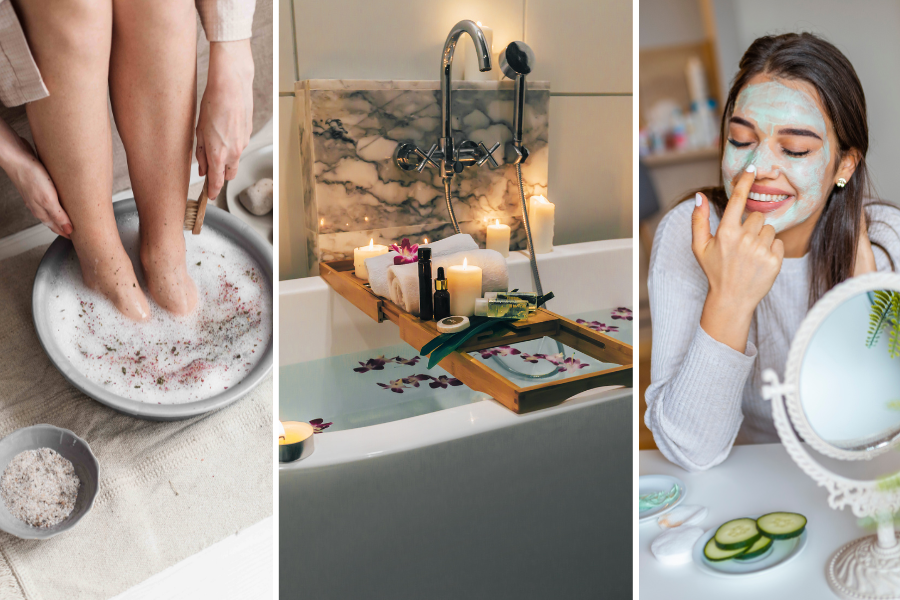Glowing skin is often seen as a sign of health and vitality. Achieving that radiant complexion, however, requires more than just good genes—it takes a consistent skincare routine tailored to your skin’s needs. Whether you’re dealing with dullness, uneven skin tone, or just want to boost your skin’s natural glow, following the right steps can make all the difference. This guide will provide you with a step-by-step skincare routine designed to give you glowing, healthy skin. Ready to reveal your radiance? Let’s explore creating a skincare routine for glowing skin with these essential skincare practices that will help you achieve a luminous complexion.
Skincare Routine for Glowing Skin
Understanding Your Skin Type
The Importance of Knowing Your Skin Type (e.g., Oily, Dry, Combination, Sensitive)
Knowing your skin type is the foundation of an effective skincare routine:
- Tailored Products: Using products suited for your specific skin type ensures better results and minimizes the risk of irritation.
- Customized Routine: Understanding your skin’s needs helps you build a routine that addresses specific concerns like dryness, oiliness, or sensitivity.
- Skin Health: Properly caring for your skin type prevents common issues such as breakouts, redness, or excessive dryness.
How to Determine Your Skin Type for a Customized Skincare Routine
Identify your skin type to create a personalized routine:
- The Bare Face Test: Cleanse your face and leave it bare for a few hours to see how your skin behaves—shiny areas indicate oiliness, while tightness suggests dryness.
- Professional Assessment: Visit a dermatologist for a professional skin analysis, especially if you have complex skin concerns.
- Observe and Adjust: Regularly assess how your skin reacts to products and adjust your routine as needed.
Tips for Choosing Products That Cater to Your Specific Skin Needs
Select products that align with your skin’s unique characteristics:
- Oily Skin: Look for oil-free, non-comedogenic products that control shine and reduce excess sebum.
- Dry Skin: Choose hydrating, cream-based products that replenish moisture and soothe irritation.
- Combination Skin: Use a balanced approach with products that target oily areas without drying out the rest of your face.
- Sensitive Skin: Opt for gentle, fragrance-free products with soothing ingredients like aloe vera or chamomile.
Cleansing: The First Step to Glowing Skin
The Importance of Cleansing to Remove Dirt, Oil, and Impurities
Cleansing is crucial for maintaining clear, healthy skin:
- Daily Cleansing: Removing dirt, oil, and makeup prevents clogged pores and breakouts.
- Morning and Night: Cleanse twice daily to prepare your skin for the day and remove impurities before bed.
- Foundation for Skincare: Clean skin allows other products like serums and moisturizers to penetrate more effectively.
How to Choose the Right Cleanser for Your Skin Type
Pick a cleanser that suits your skin’s specific needs:
- Oily Skin: Use a foaming or gel cleanser that removes excess oil without stripping the skin.
- Dry Skin: Choose a cream or hydrating cleanser that adds moisture and soothes dryness.
- Combination Skin: Opt for a gentle, balanced cleanser that cleanses without causing dryness or oiliness.
- Sensitive Skin: Look for a hypoallergenic, fragrance-free cleanser that gently cleans without irritation.
Tips for Proper Cleansing Techniques (e.g., Double Cleansing, Gentle Exfoliation)
Proper techniques enhance the effectiveness of cleansing:
- Double Cleansing: Start with an oil-based cleanser to remove makeup and sunscreen, followed by a water-based cleanser to clean the skin thoroughly.
- Gentle Touch: Avoid harsh scrubbing; use gentle, circular motions to cleanse your skin without causing irritation.
- Lukewarm Water: Use lukewarm water to rinse, as hot water can strip the skin of its natural oils.
Exfoliation for a Radiant Complexion
The Role of Exfoliation in Removing Dead Skin Cells and Promoting Cell Turnover
Exfoliation is key to achieving glowing skin:
- Cell Turnover: Exfoliating removes dead skin cells, promoting the growth of new, healthy cells for a brighter complexion.
- Smooth Texture: Regular exfoliation helps smooth out rough patches and uneven skin texture, revealing softer skin.
- Improved Absorption: By clearing away dead skin cells, exfoliation allows other skincare products to penetrate more effectively.
How Often to Exfoliate Based on Your Skin Type
Frequency of exfoliation depends on your skin’s needs:
- Oily Skin: Exfoliate 2-3 times a week to prevent clogged pores and breakouts.
- Dry Skin: Limit exfoliation to once a week to avoid over-drying and irritation.
- Combination Skin: Exfoliate 1-2 times a week, focusing on oily areas while being gentle on drier patches.
- Sensitive Skin: Exfoliate no more than once a week with a mild exfoliant to prevent irritation.
Choosing the Right Exfoliant: Physical vs. Chemical Exfoliators
Select the exfoliant that suits your skin type and concerns:
- Physical Exfoliants: Use scrubs with fine particles for a gentle, manual exfoliation, but avoid if you have sensitive skin.
- Chemical Exfoliants: Opt for AHAs (e.g., glycolic acid) or BHAs (e.g., salicylic acid) for a deeper, more even exfoliation that dissolves dead skin cells.
- Combination Approach: Some may benefit from alternating between physical and chemical exfoliants, depending on their skin’s condition.
Hydrating with Toners and Serums
The Benefits of Using a Hydrating Toner to Balance Your Skin’s pH
Toners are essential for hydration and balance:
- pH Balance: A toner helps restore your skin’s natural pH after cleansing, preparing it for better absorption of subsequent products.
- Hydration Boost: Hydrating toners provide an extra layer of moisture, especially for dry or dehydrated skin.
- Soothing Effect: Many toners contain calming ingredients like rose water or chamomile that soothe and refresh the skin.
How Serums Target Specific Skin Concerns (e.g., Brightening, Hydration, Anti-Aging)
Serums are potent treatments for targeted issues:
- Brightening Serums: Look for ingredients like vitamin C or niacinamide to reduce dark spots and enhance radiance.
- Hydrating Serums: Hyaluronic acid-based serums are excellent for locking in moisture and plumping the skin.
- Anti-Aging Serums: Retinol, peptides, and antioxidants help reduce the appearance of fine lines and wrinkles.
The Importance of Layering Products for Maximum Absorption and Effectiveness
Proper layering enhances the effectiveness of your skincare routine:
- Toner First: Apply toner immediately after cleansing to prep your skin and enhance absorption.
- Serum Next: Follow with a serum, allowing it to penetrate deeply into your skin for targeted treatment.
- Moisturizer Last: Seal in all the beneficial ingredients with a moisturizer to keep your skin hydrated and protected.
Moisturizing for Long-Lasting Glow
Why Moisturizing Is Essential for All Skin Types, Even Oily Skin
Moisturizing is a non-negotiable step for everyone:
- Hydration: Moisturizers lock in moisture, preventing dehydration and maintaining skin’s suppleness.
- Barrier Protection: They reinforce the skin’s natural barrier, protecting against environmental damage.
- Balance: Even oily skin benefits from moisturizing, as it helps balance oil production and prevents excess sebum.
How to Choose a Moisturizer That Suits Your Skin’s Needs (e.g., Gel, Cream, Oil)
Pick a moisturizer that complements your skin type:
- Oily Skin: Opt for lightweight, oil-free gels that hydrate without clogging pores.
- Dry Skin: Choose rich creams or oils that provide deep hydration and nourish dry, flaky areas.
- Combination Skin: Use a balanced formula that hydrates without being too heavy or greasy.
- Sensitive Skin: Look for fragrance-free, hypoallergenic options that calm and protect delicate skin.
Tips for Locking in Moisture and Achieving a Plump, Dewy Complexion
Maximize the effectiveness of your moisturizer:
- Damp Application: Apply moisturizer while your skin is still slightly damp to lock in hydration.
- Layering: Consider layering a hydrating serum underneath your moisturizer for added moisture.
- Nighttime Nourishment: Use a heavier moisturizer or overnight mask before bed to wake up with plump, dewy skin.
Protecting Your Skin with Sunscreen
The Critical Role of Sunscreen in Preventing Sun Damage and Maintaining Skin Health
Sunscreen is vital for protecting your skin’s health:
- UV Protection: Sunscreen shields your skin from harmful UVA and UVB rays, preventing sunburn, premature aging, and skin cancer.
- Skin Preservation: Regular use of sunscreen helps maintain an even skin tone and reduces the risk of hyperpigmentation and dark spots.
- Daily Necessity: Sunscreen should be worn every day, regardless of the weather or indoor/outdoor activity.
How to Choose the Right Sunscreen (e.g., SPF, Broad-Spectrum Protection)
Selecting the right sunscreen ensures effective protection:
- SPF Level: Choose a sunscreen with at least SPF 30 for adequate protection against UVB rays.
- Broad-Spectrum: Ensure your sunscreen offers broad-spectrum protection to guard against both UVA and UVB rays.
- Skin Type Considerations: For oily or acne-prone skin, opt for non-comedogenic, matte-finish formulas; for dry skin, choose moisturizing sunscreens.
Tips for Applying Sunscreen Properly and Incorporating It into Your Daily Routine
Proper application is key to effective sun protection:
- Generous Application: Apply a sufficient amount—about a quarter teaspoon for the face alone—and reapply every two hours when exposed to the sun.
- Don’t Skip Areas: Cover often-missed areas like the ears, neck, and the back of your hands.
- Daily Habit: Make sunscreen application a part of your morning skincare routine, even on cloudy days or when staying indoors.
Targeted Treatments for Extra Glow
How to Incorporate Brightening Products Like Vitamin C and Niacinamide
Brightening treatments enhance skin’s radiance:
- Vitamin C: Use a vitamin C serum to combat dullness, fade dark spots, and protect against environmental damage.
- Niacinamide: This versatile ingredient brightens skin tone, reduces redness, and improves overall texture.
- Layering Tips: Apply brightening serums after cleansing and toning but before moisturizing for best results.
The Benefits of Using Face Masks and Treatments for an Added Boost of Radiance
Face masks offer intensive treatment for glowing skin:
- Sheet Masks: Infused with serums, sheet masks provide an instant boost of hydration and brightness.
- Clay Masks: Great for oily skin, clay masks draw out impurities and leave the skin refreshed and glowing.
- Frequency: Use a face mask 1-2 times a week to supplement your skincare routine with an extra dose of nutrients.
Tips for Addressing Specific Concerns Like Hyperpigmentation or Dullness
Target specific issues with the right treatments:
- Hyperpigmentation: Use products containing ingredients like kojic acid, licorice extract, or alpha arbutin to lighten dark spots and even out skin tone.
- Dullness: Exfoliating serums or masks with AHAs can help remove dead skin cells and reveal brighter skin.
- Customized Approach: Consider consulting with a dermatologist for personalized treatment options if you have persistent skin concerns.
Nighttime Skincare Routine for Repair and Glow
The Importance of Nighttime Skincare in Repairing and Rejuvenating the Skin
Nighttime is crucial for skin repair:
- Overnight Renewal: Skin regenerates and repairs itself during sleep, making nighttime the ideal time for treatments.
- Deep Hydration: Night creams and serums are formulated to deeply hydrate and restore the skin while you rest.
- Skin Cell Turnover: Use retinoids or other anti-aging products at night to take advantage of the skin’s natural renewal process.
How to Incorporate Retinol or Other Night Treatments for Glowing Skin
Powerful night treatments can transform your skin:
- Retinol: Introduce retinol gradually into your routine to stimulate collagen production, reduce wrinkles, and enhance radiance.
- Peptides and Growth Factors: Use night creams enriched with these ingredients to support skin repair and regeneration.
- Moisturizing: Follow with a rich moisturizer to lock in the treatment and keep your skin hydrated overnight.
Tips for a Soothing Nighttime Routine That Promotes Overnight Skin Regeneration
Wind down with a calming and restorative routine:
- Cleanse Thoroughly: Remove all makeup and impurities to allow your skin to breathe and absorb treatments effectively.
- Layering: Apply treatments in the correct order—lighter serums first, followed by heavier creams or oils.
- Relaxation: Incorporate relaxing rituals like a warm bath, calming herbal tea, or soothing music to prepare your mind and body for sleep.
The Role of Diet and Hydration in Skin Health
How What You Eat Affects Your Skin’s Appearance
Nutrition plays a vital role in skin health:
- Skin-Friendly Foods: Diets rich in antioxidants, vitamins, and healthy fats can improve skin texture, tone, and radiance.
- Anti-Inflammatory Diet: Eating anti-inflammatory foods like leafy greens, berries, and fatty fish can reduce redness and prevent breakouts.
- Avoiding Sugar and Processed Foods: These can lead to breakouts, dullness, and premature aging.
Foods and Nutrients That Promote Glowing Skin (e.g., Antioxidants, Omega-3s, Vitamins)
Feed your skin from within:
- Antioxidants: Foods like blueberries, dark chocolate, and green tea fight free radicals and prevent skin damage.
- Omega-3 Fatty Acids: Found in fish, flaxseeds, and walnuts, omega-3s keep your skin supple and hydrated.
- Vitamins A, C, and E: Essential for skin health, these vitamins promote cell turnover, collagen production, and protection against sun damage.
The Importance of Staying Hydrated for a Clear, Radiant Complexion
Hydration is key to glowing skin:
- Water Intake: Drink at least 8 glasses of water daily to keep your skin hydrated from the inside out.
- Hydrating Foods: Include water-rich foods like cucumbers, watermelon, and oranges in your diet.
- Topical Hydration: Complement your water intake with hydrating skincare products like hyaluronic acid serums and moisturizing creams.
Lifestyle Habits for Glowing Skin
The Impact of Sleep, Stress Management, and Exercise on Skin Health
Healthy habits reflect on your skin:
- Sleep: Aim for 7-9 hours of sleep each night to allow your skin to repair and rejuvenate.
- Stress Management: Practice stress-reduction techniques like meditation, yoga, or deep breathing to prevent stress-related skin issues.
- Exercise: Regular physical activity boosts circulation, delivering oxygen and nutrients to your skin, giving it a healthy glow.
Tips for Maintaining a Balanced Lifestyle That Supports Glowing Skin
Your lifestyle directly impacts your skin’s appearance:
- Consistent Sleep Schedule: Go to bed and wake up at the same time each day to regulate your body’s natural rhythm.
- Balanced Diet: Focus on whole, nutrient-rich foods that nourish your skin and body.
- Mindful Living: Incorporate mindfulness practices into your daily routine to reduce stress and promote overall well-being.
How to Create a Holistic Approach to Skincare That Includes Healthy Habits
Adopt a holistic view of skincare:
- Mind-Body Connection: Understand that mental, emotional, and physical health all contribute to the condition of your skin.
- Routine Building: Create a daily routine that combines skincare, nutrition, exercise, and stress management for comprehensive skin health.
- Consistency: Stick to your routine and be patient; glowing skin is a reflection of consistent, healthy habits over time.
By following this skincare routine for glowing skin, you can achieve and maintain a radiant complexion that reflects your overall health and well-being. From understanding your skin type to adopting healthy lifestyle habits, each step plays a crucial role in your journey to glowing skin.
Skincare Routine for Glowing Skin Wrap Up:
Achieving glowing skin is a combination of the right skincare routine, proper product selection, and healthy lifestyle choices. By following these steps and tailoring your routine to your specific skin type, you can enhance your skin’s natural radiance and enjoy a healthy, luminous complexion every day. Remember, consistency is key—stick to your routine and give your skin the care it deserves. Ready to glow? Follow this guide and start your journey to radiant, beautiful skin today.
This post was all about creating a Skincare Routine for Glowing Skin.
Other Posts You Might Like:





